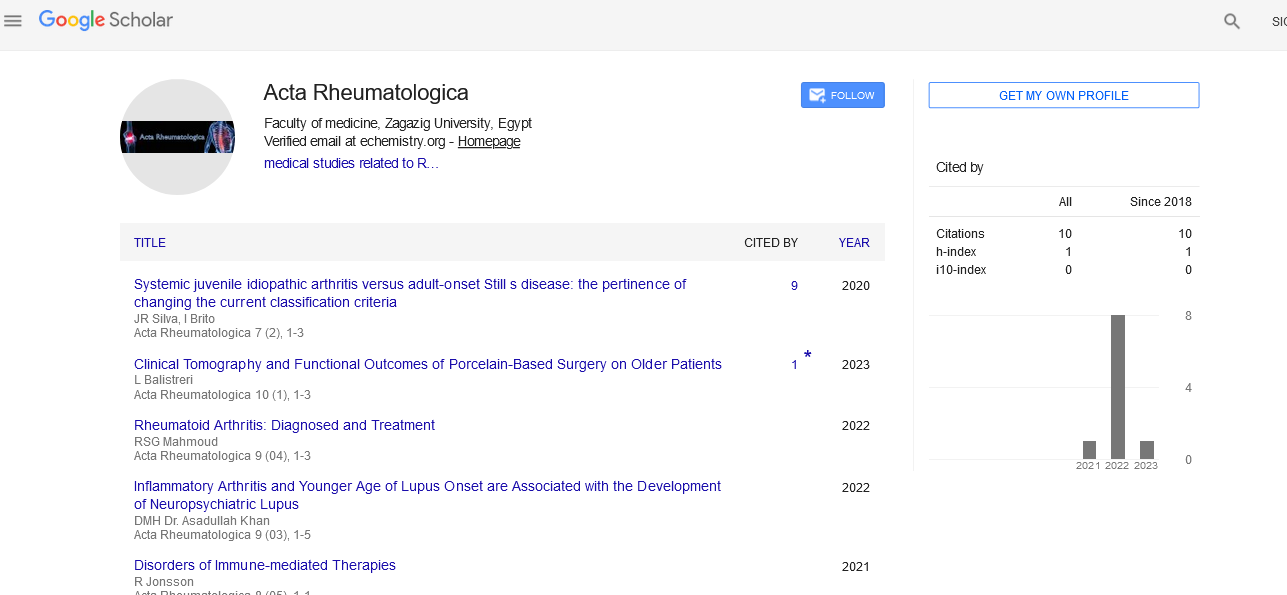Perspective - (2024) Volume 11, Issue 6
Management of Rheumatoid Arthritis in Pregnancy: Safety of Medications
Bernard Ashley*
Department of Medical Sciences, Herbert Wertheim College of Medicine, United States
*Correspondence:
Bernard Ashley, Department of Medical Sciences, Herbert Wertheim College of Medicine,
United States,
Email:
Received: 15-Nov-2024, Manuscript No. IPAR-24-15243;
Editor assigned: 19-Nov-2024, Pre QC No. IPAR-24-15243 (PQ);
Reviewed: 03-Dec-2024, QC No. IPAR-24-15243;
Revised: 13-Dec-2024, Manuscript No. IPAR-24-15243 (R);
Published:
20-Dec-2024
Introduction
Rheumatoid Arthritis (RA) is a chronic autoimmune condition
characterized by inflammation of the joints, which can
significantly affect quality of life. For women of childbearing age,
the management of RA during pregnancy presents unique
challenges. The interplay between the disease, its treatment,
and the safety of medications for both the mother and the
developing fetus necessitates a careful and informed approach.
This article discusses the management of rheumatoid arthritis in
pregnancy, focusing on the safety of various medications and
strategies for optimizing maternal and fetal health.
Understanding rheumatoid arthritis in pregnancy
Pregnancy can have varying effects on rheumatoid arthritis.
Some women experience an improvement in symptoms during
pregnancy, particularly in the second and third trimesters,
possibly due to hormonal changes and increased production of
anti-inflammatory cytokines. However, others may experience
exacerbations, especially in the postpartum period. Therefore,
individualized treatment plans are essential to manage RA
effectively while ensuring the safety of both mother and baby.
Description
Key considerations in medication management
Pre-conception counseling: Before conception, women with
RA should engage in thorough preconception counseling. This
involves:
Reviewing disease control: Ensuring optimal control of RA
before pregnancy can reduce the risk of flare-ups.
Assessing medications: Discussing current medications and
their potential effects on pregnancy and fetal development is
crucial.
Planning for adjustments: Some medications may need to
be altered or discontinued prior to conception to minimize risks.
Safety of medications
The management of RA in pregnancy often involves balancing
effective disease control with the safety of medications. Below is an overview of commonly used medications and their safety
profiles during pregnancy:
Non-Steroidal Anti-Inflammatory Drugs (NSAIDs)
First trimester: The use of NSAIDs, particularly non-selective
types like ibuprofen, is generally avoided in the first trimester due
to potential risks of miscarriage and congenital malformations.
Second and third trimesters: While some NSAIDs can be used
later in pregnancy, caution is advised as they can cause
complications such as premature closure of the ductus arteriosus
in the fetus.
Glucocorticoids
Safety profile: Low-dose glucocorticoids (e.g., prednisone) are
often considered safe during pregnancy. They can be necessary
for controlling disease activity, particularly if other medications
are contraindicated.
Monitoring: It is essential to monitor for potential side
effects, such as gestational diabetes and hypertension.
Disease-Modifying Anti-Rheumatic Drugs (DMARDs)
Methotrexate: This drug is contraindicated in pregnancy due
to its teratogenic effects and association with fetal loss. Women
should discontinue methotrexate at least three months prior to
conception.
Sulfasalazine: Generally considered safe, sulfasalazine can be
used during pregnancy. It may even provide some protective
effect against flare-ups.
Hydroxychloroquine: This DMARD is often deemed safe and is
frequently used in pregnant women with RA, particularly for
those with overlapping conditions like lupus.
Leflunomide: This medication is contraindicated in pregnancy
due to its teratogenic potential. Women of childbearing age
should be switched to safer alternatives prior to conception.
Biologic therapies
Biologics represent a newer class of DMARDs that target
specific pathways involved in inflammation. Their use in
pregnancy requires careful consideration:
TNF inhibitors: Drugs such as etanercept and infliximab have
been shown to have a relatively favorable safety profile during pregnancy. Studies suggest no significant increase in congenital
malformations.
IL-6 inhibitors: Medications like tocilizumab are generally not
recommended during pregnancy due to limited safety data.
B-cell depleting agents: Rituximab is typically avoided during
pregnancy due to concerns about potential effects on fetal
immune system development.
Management strategies
Managing rheumatoid arthritis in pregnancy requires a tailored
approach that considers the mother’s health, the progression of
the disease, and the safety of medications. Key strategies include:
Regular monitoring: Frequent check-ups with rheumatologists
and obstetricians can help track disease activity and adjust
medications as necessary.
Physical therapy: Engaging in physical therapy can help
maintain joint function and reduce pain, providing a nonpharmacological
approach to managing symptoms.
Patient education: Educating patients about the potential
effects of medications and the importance of adherence to
treatment plans is vital for optimal outcomes.
Postpartum considerations
The postpartum period can pose significant challenges for
women with RA. Many experience a flare in symptoms after
delivery due to hormonal changes and physical stress.
Additionally, the introduction of new stressors, such as caring for
a newborn, can complicate management.
Medication resumption: After childbirth, it may be necessary
to resume or adjust medications. Women should consult their
healthcare providers to determine the most appropriate
regimen that balances effective disease control with
breastfeeding considerations.
Breastfeeding: Many RA medications are compatible with
breastfeeding, but it is essential to assess individual cases.
Medications like glucocorticoids and sulfasalazine are generally
safe during lactation, while others may require caution or
avoidance.
Support networks: Establishing a strong support network,
including family, friends, and healthcare professionals, can help
manage the physical and emotional challenges of postpartum
life while dealing with RA.
Conclusion
The management of rheumatoid arthritis during pregnancy is
a complex interplay of maintaining disease control and ensuring
the safety of both mother and child. Through careful planning,
preconception counseling, and informed decision-making
regarding medication use, healthcare providers can help
pregnant women with RA navigate their treatment options
effectively. Ongoing research and clinical experience continue to
enhance our understanding of the safety and efficacy of various
medications in this context, ultimately improving outcomes for
mothers and their babies. By fostering open communication and
collaboration among rheumatologists, obstetricians, and
patients, we can achieve optimal management of rheumatoid
arthritis in pregnancy.
Citation: Ashley B (2024) Management of Rheumatoid Arthritis in Pregnancy: Safety of Medications. Acta Rheuma Vol:11 No:6





